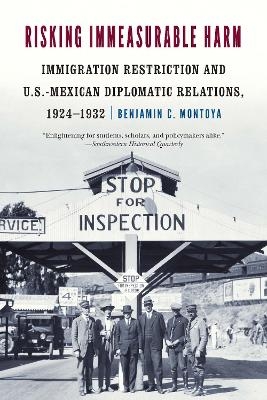
Risking Immeasurable Harm
University of Nebraska Press (Verlag)
978-1-4962-3886-3 (ISBN)
The debate over restricting the number of Mexican immigrants to the United States began early in the twentieth century, at a time when U.S.-Mexican relations were still tenuous after the Mexican Revolution and when heated conflicts over mineral rights, primarily oil, were raging between the two nations. Though Mexico had economic reasons for curbing emigration, the racist tone of the quota debate taking place in the United States offended Mexicans’ national pride and played a large part in obstructing mutual support for immigration restriction between the United States and Mexico.
Risking Immeasurable Harm explains how the prospect of immigration restriction affects diplomatic relations by analyzing U.S. efforts to place a quota on immigration from Mexico during the late 1920s and early 1930s. Benjamin C. Montoya follows the quota debate from its origin in 1924, spurred by the passage of the Immigration Act, to its conclusion in 1932. He examines congressional policy debate and the U.S. State Department’s steady opposition to the quota scheme. Despite the concerns of American diplomats, in 1930 the Senate passed the Harris Bill, which singled out Mexico among all other Latin American nations for immigration restriction. The lingering effects of the quota debates continued to strain diplomatic relations between the United States and Mexico beyond the Great Depression.
Relevant to current debates about immigration, Risking Immeasurable Harm demonstrates the connection between immigration restriction and diplomacy, the ways racism can affect diplomatic relations, and how domestic immigration policy can have international consequences.
Benjamin C. Montoya is an associate professor of history at Schreiner University. He is the author of A Diplomatic History of U.S. Immigration during the 20th Century: Policy, Law, and National Identity and a coeditor of Beyond 1917: The United States and the Global Legacies of the Great War.
List of Illustrations
Acknowledgments
Introduction
1. The Basis for the Quota Drive against Mexico: Winter 1924–Fall 1927
2. Singling Out Mexico for Restriction: Winter 1927–1928
3. International Pressure against the U.S. Effort to Restrict Mexican Immigration: Spring 1928
4. The Advantages, Disadvantages, Risks, and Rewards of Immigration Restriction: Fall 1928
5. The U.S. Senate Passes a Quota on Mexico: Winter 1929–Spring 1930
6. Administrative Restriction, Repatriation, and the Demise of the Quota Effort: Summer 1930–Winter 1932
Conclusion
Epilogue
Notes
Bibliography
Index
| Erscheinungsdatum | 18.03.2024 |
|---|---|
| Zusatzinfo | 9 tables, 1 graph, index |
| Verlagsort | Lincoln |
| Sprache | englisch |
| Maße | 152 x 229 mm |
| Themenwelt | Geschichte ► Allgemeine Geschichte ► Neuzeit (bis 1918) |
| Geisteswissenschaften ► Geschichte ► Regional- / Ländergeschichte | |
| Sozialwissenschaften ► Politik / Verwaltung ► Staat / Verwaltung | |
| ISBN-10 | 1-4962-3886-9 / 1496238869 |
| ISBN-13 | 978-1-4962-3886-3 / 9781496238863 |
| Zustand | Neuware |
| Informationen gemäß Produktsicherheitsverordnung (GPSR) | |
| Haben Sie eine Frage zum Produkt? |
aus dem Bereich


